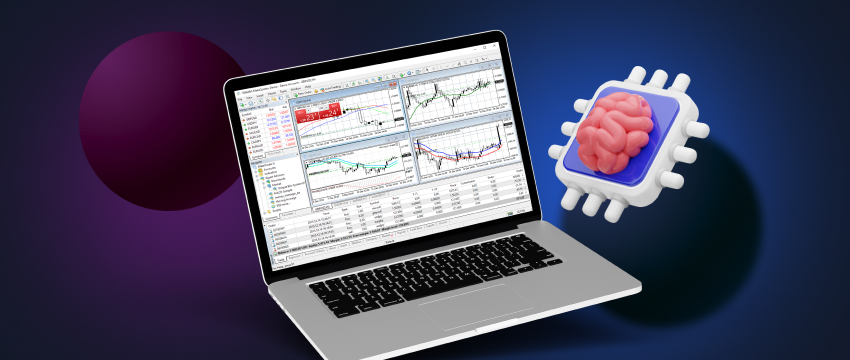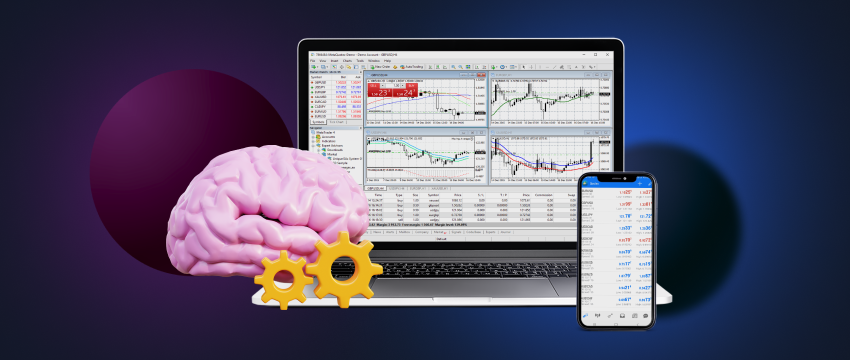Forex trading is a challenging activity that demands a solid grasp of market fundamentals and technical analysis, as well as an in-depth understanding of human psychology in trading. Successful forex traders know that their mindset plays a significant role in their trading performance.
Trading psychology includes various mental and emotional factors that influence traders of all levels of expertise. Personal development and continuous learning are invaluable for enhancing trading psychology.
Successful traders know how to manage and eliminate emotions from their trading decisions. This is achieved by overcoming greed, following risk management strategies, and using a consistent plan. Recognising moments of emotional trading, detaching, and returning to a strategic mindset can be challenging but is essential for long-term success.
This article will explore the connection between forex trading and psychology and how biases, such as overconfidence and herd behaviour, affect trading decisions.

Emotions in forex trading psychology
Emotions are integral to human decision-making and play an important role in trading behaviour, especially in the forex market. The most common emotions experienced by forex traders include:
Greed
Greed is characterised as a strong desire for wealth, often leading traders to believe that happiness depends on accumulating maximum wealth. This emotion can dangerously cloud a trader’s judgment and derail their future goals. Greed can drive traders towards various suboptimal behaviours, including:
1. Using too much leverage to maximise potential gains.
2. Continuing to invest in losing trades, hoping for a reversal
3. Investing more funds into losing positions with expectations of a turnaround
Fear
Fear drives traders to close positions too early or refrain from taking risks due to concerns about significant losses. This emotion becomes particularly pronounced in bear markets, prompting irrational decisions as traders rush to exit the market. Fear can quickly escalate into panic, generally triggering widespread selloffs in the market due to panic selling.
Regret
Regret may drive a trader to enter a trade after initially missing out, often when the stock price has already increased. This break in trading discipline frequently results in losses as prices drop from their peak highs.
Behavioural biases and trading psychology
Traders typically encounter two types of behavioural biases: cognitive biases and emotional biases. Cognitive biases are errors or blind spots in thinking that stem from subconscious mental processes.
Examples include overconfidence bias and anchoring bias. Emotional biases, on the other hand, arise from feelings, moods, perceptions, or beliefs. These include herding behaviour, loss aversion bias and the emotional impacts of fear and greed. Both cognitive and emotional biases can lead to irrational judgments and bad decision-making. Let’s explore a few examples below:
Overconfidence:
Building a confident trading mindset is key for success in forex markets. However, you need to strike the right balance, as too much or too little confidence can impact your trading decisions.
Overconfidence occurs when you’ve developed a winning strategy and executed it successfully. As your confidence grows, you begin to feel like you can outsmart the market by trading excessively, even if they do not align with your trading plan.
Deviating from your plan can lead to breaking the discipline you have developed, including your risk management strategies. Overconfidence may also tempt you into hasty decisions or high-risk trades that expose you to significant losses.
Professional traders understand the importance of sticking to a disciplined trading plan. They know there is no reason to take trades that do not meet their predefined criteria. As a trader, remember that forex trading isn’t a sprint but a meticulous process that involves managing emotions and avoiding impulsive decisions.
When overconfidence sets in, take a moment to reflect and refocus on the fundamentals of forex: risk management, following a trading plan, and trading psychology. This approach will help you stay competitive in the long term.
Herd behaviour:
Herd behaviour refers to how individuals tend to copy the financial actions of the majority. The natural human desire to belong to a group can lead investors to copy the behaviours of others. When a large group moves in a particular direction, individuals may feel compelled to follow in the same direction rather than going against the trend.
This often results in investors joining buying trends without doing their own research, assuming others have already done so. For example, during the dotcom bubble, many investors rushed to buy stocks of internet companies based on the belief that others were making big profits. However, the performance of these stocks was disappointing, leading to a sharp crash in prices.
Emotional gap:
The emotional gap refers to decisions influenced by intense emotions like anxiety, anger, fear, or excitement, leading to irrational choices. Fear and greed can cause people to overreact, creating situations like unfounded optimism, excessive enthusiasm, asset bubbles, or conversely, market panic and big sell-offs.
Anchoring:
Anchoring refers to attaching a financial decision to a random reference point. Examples include consistently spending based on a specific budget level or rationalising spending based on personal satisfaction thresholds.
In investing, anchoring occurs when individuals use irrelevant information, such as the purchase price of a security as a reference point for decision making.
This can lead them to hold onto investments that have declined in value because they anchor their estimate of fair value to the original purchase price. This behaviour may result in holding on to the security, hoping it will return to the purchase price, without considering its future prospects or outlook.
Loss Aversion:
In traditional finance, loss aversion describes the tendency of most investors to avoid investments that carry more risk than they are willing to tolerate. This principle applies in a similar way to forex trading, where traders worry more about losses than they enjoy gains.
Avoiding risk can benefit traders as it encourages cautious trading with higher success rates and lower risks. But loss aversion can hold back a trader’s progress. They often exit trades prematurely after a small profit, fearing that the gains might disappear quickly. This prevents them from maximising their profits on winning trades.
Another common behaviour is cutting losses too early, rather than allowing the trade to play out. These decisions are influenced by the psychological bias of loss aversion or a lack of confidence in one’s trading system.

Pitfalls in trading psychology
Neglecting trading psychology can lead you into numerous pitfalls driven by behavioural biases, including:
Selling winning investments too soon:
This involves quickly selling profitable trades while holding on to losing ones in the hope they will bounce back to the purchase price.
Herd behaviour:
This involves following the crowd and chasing recent top-performing assets without conducting proper research or considering their future potential.
Impulsive decisions:
Acting impulsively on information, often due to overestimating your trading abilities.
Overtrading:
Trading excessively, underestimating risks and failing to diversify your portfolio adequately.
Emotional reactions:
Making decisions based on fear or greed, particularly during volatile market conditions.
Understanding trading psychology helps you recognise and avoid these traps, allowing you to make better informed, rational decisions.
Strategies to overcome biases and avoid pitfalls
There are various strategies that you can use to overcome biases and avoid common pitfalls:
Increase self-awareness:
Learning about behavioural finance principles can make you more aware of your personal biases and lead to better decision-making.
Develop a trading plan:
Creating and following a trading plan that includes clear trading rules and risk management strategies can provide a structured approach to trading, reducing emotional decision making.
Conduct objective research:
Performing thorough fundamental or technical analysis research and considering a range of data, including opposing views, can help you avoid herd behaviour and challenge your own assumptions.
By implementing these strategies, you can make informed and rational decisions, reducing the influence of behavioural biases.

Key strategies for risk management
Risk management is a crucial aspect of trading psychology. By prioritising continuous learning and personal development, you can enhance your ability to manage risk effectively, thus minimising potential losses.
Effective risk management involves setting suitable stop-loss levels, diversifying your portfolio, and avoiding impulsive or emotional trading decisions. Recognising the importance of risk management and implementing effective strategies helps you safeguard your capital and achieve consistent profitability over the long term.
In summary
Trading psychology significantly influences trading success, in combination with knowledge and skill. Biases, subjective prejudices, unconscious mental patterns, and emotions like fear and greed influence traders’ decision-making processes and overall trading performance in the market.
Behavioural finance explores these influences on financial decisions and market behaviour. Common biases include overconfidence, herd behaviour, the emotional gap, anchoring, and loss aversion. By understanding these behavioural patterns, traders can make better decisions and achieve better trading results.
Disclaimer: This material is for general informational and educational purposes only and should not be considered investment advice or an investment recommendation. T4Trade is not responsible for any data provided by third parties referenced or hyperlinked in this communication.




